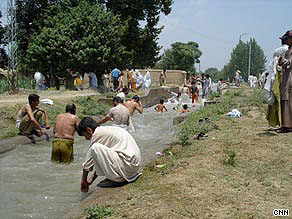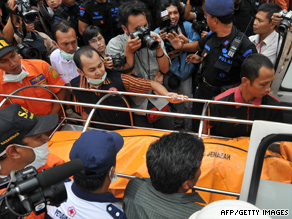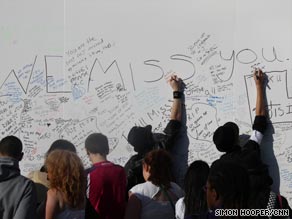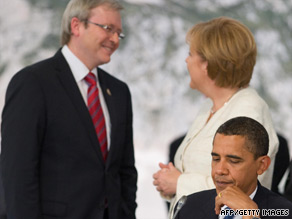|
July 22, 2009
Posted: 1028 GMT
YANGSHAN ISLAND, China – As the countdown began, my producer Jo Kent sighed. “This might be the most anticipated anti-climax ever.” Clouds threatened to ruin the longest total solar eclipse of the 21st century, until the very last minute. After much deliberation and intense consultation with eclipse chasers across Shanghai, we decided to post ourselves on Yangshan Island, about 150 km off the coast. The chasers heading in this direction were very convincing. On the island, they said we’d have a lower chance of clouds and city pollution. And hundreds of them were going there. It was hard not to get swept up in the group mentality. But by the time we arrived, it was raining. Not just raining, but thundering and lightning. I went to bed listening to thunder claps, petrified that we would miss out on the eclipse of my lifetime (and also my first ever). Despite a dream that the heavens miraculously cleared, we woke to cloudy skies. Dark, cloudy skies. Still, the crowds there said we should stick it out. In the elevator, one man told me: “I’m renewing my belief in God right now.” After all, the total eclipse itself wasn’t happening for another couple of hours. Charles Fulco, a middle-school astronomy teacher from New York, confidently claimed he would stay optimistic until the end. Personally, it was difficult to keep doubt from “clouding” my mind. I knew I had to stay positive for our viewers. After all, there’s nothing compelling about a correspondent predicting the worst over and over again. I was trying to put on a happy face for my next live shot when I heard “oohs” and “ahhs” in the background. I was so flustered, I forgot to put on my eclipse glasses before I looked up. A partial eclipse was shining down on us all like a gift from Mother Nature. The rush was undeniable. I was amazed, shocked, and most of all, relieved, that we had something to show the world. Clouds quickly swooped in, completely eliminating any chance of seeing totality — that treasured moment when the sun is completely hidden behind the moon and its outer atmosphere (the “corona”) is visible like a halo around the moon’s shadow. Nonetheless, Yangshan Island was swiftly shrouded in darkness. I mean, it happened in minutes and suddenly we were all pitched into black. The air grew cold. Hundreds of dragonflies that had been swarming for hours disappeared. I was reporting the entire time, but wished I could take a breath and soak in this awesome, haunting feeling. The sun had literally vanished in midday. And just as the skies started to brighten again, the clouds relented one last time. We saw another flash of light at the end of totality. It looked like a crescent moon in an evening sky, but in fact it was a sliver of the sun — the sun rising for the second time at the end of one of the most unnatural-seeming natural wonders. Of course, there were a lot of disappointed eclipse watchers who’d traveled thousands of miles, spent thousands of dollars, to see this from beginning to end. But these fleeting glimpses were enough for me. Our days of eclipse chasing — the cynicism, the science, the insanity of gambling to see the solar system in action — was exhilarating, even though we only witnessed a slice of astronomical glory. Posted by: CNN Correspondent, Emily Chang Posted: 548 GMT
HONG KONG, China – Ten years ago, I experienced a total solar eclipse in northern France. It was as if someone had turned off the lights on a Hollywood set and we were in the blackest of nights. The sky turned purple and I saw some stars. It became cooler and a breeze picked up, though it was late morning. 
A girl peers through a telescope Wednesday in Hong Kong to witness the solar eclipse.
When I was heading out on the train to the rural area where I watched the eclipse, I met people who had traveled from across the world to see it. I did not know then what the appeal was, but afterward, I vowed to make it to any other eclipses that I could. Fast forward to one week ago when I learned I was living in the path of another total solar eclipse. It reminded me of that feeling of witnessing the power of Mother Nature — to turn day into night, then back into day – and in the process play a little game with humans and animals with the sudden switching on and off of the lights. Today, I went out to a primary school in Hong Kong, where sky gazers gathered in droves. They were armed with sun goggles, telescopes, binoculars, a large solar filter and even a homemade eclipse viewer. The air was charged with enthusiasm, and I was swept along with it. I knew we were only getting a partial eclipse of 75 percent, and so it would not equal my earlier experience, but the skies were unusually sunny for what has been a very rainy typhoon season in the southern Chinese enclave. Hong Kong is a typically busy financial hub, cluttered with skyscrapers and block after block of apartment buildings. Even if it had not been raining, the city could have been covered in an all-too-frequent haze that blocks out the sun. At the school, I spoke with parents who made their daughter a homemade eclipse viewer, a woman who brought her family and her housekeeper, a 13-year-old astronomy enthusiast who asked his teacher to join him, among others. The astronomy enthusiast, Louis Chung, told me: “City folks wouldn’t usually be able to see this.” “Nature is wonderful. It is awesome to know that nature can provide such spectacular sights,” said Chung, a member of the Hong Kong Astronomical Society. Yolanda Yip, 12, came with her parents to the school. Her father, Frankie Yip, fashioned a homemade way to see the eclipse: He took a shoe box and put aluminum foil at one end — with a small hole poked in it — and cooking paper on the other. He said he wanted Yolanda to learn more about the solar system. “We love the Earth, we want to know more about it. The sun eclipse is one of the rare phenomenons about the sun, the Earth,” said mother Sammie Chan, noting that she thought the eclipse was “gorgeous.” As the moon slowly passed over the sun, I grabbed my own solar viewer to watch. Even though the sky did not darken — it was though the lights had been dimmed — I still marveled at the show that Mother Nature had to offer us on this day. There are many things we can try and control in life, but this is one of those moments that we need to step back and watch nature conducting a grand performance for us. Posted by: CNN Digital Producer, Miranda Leitsinger July 21, 2009
Posted: 1109 GMT
SHANGHAI, China — Charles Fulco, a middle school astronomy teacher, never thought he would come to China. 
Pius Ye, 7, from Hong Kong, is currently in Shanghai to view the longest total solar eclipse of the 21st century.
But his passion for one of nature’s grandest spectacles compelled him to travel 7,000 miles from New York to Shanghai, to watch the longest total solar eclipse of the century. “I’m getting goose bumps just thinking about it,” says Fulco. “The last one I saw was 10 years ago and it’s like it happened yesterday.” Unfortunately, Mother Nature may have something very disappointing in store for him. Yes, forecasters in Shanghai are predicting rain. The weather on the day of an eclipse is always a gamble, and it’s frustrating too. As the CNN team sent to Shanghai to cover the big event, we’re just as desperate to find a hole in the clouds as eclipse-chasers from around the world. We don’t want to miss it either. So, we’ve consulted the experts, multiple tour groups, all with different strategies about how to beat the clouds. We’ve heard words like “air convection,” “cloud count” and “land temperature” thrown around. Fulco’s team is headed to Yangshan Island off the coast of Shanghai. The theory: The closer you are to a large body of water, the less dense cloud cover will be. But others say being locked on an island is dangerous. The most important thing is mobility. So a group of MIT and Princeton alumni have chosen a spot on the Chinese mainland, along a manmade lake. Yet a third group of 260 Americans with Sky and Telescope Magazine, are too difficult to keep up with. They seem to change their plans by the hour, determined to move in any direction last-minute, to ensure their view is not obscured. They are entertaining both coastal and inland options. When last we talked to them, they said would make their final decision after an intense discussion at dinner. We’ve been warned about this kind of behavior. Veteran eclipse-chasers say if you change your plans too much, you risk missing the eclipse altogether. Nevertheless, anxiety lingers as much as anticipation. We’ve neared our final decision, but you’ll have to watch us live tomorrow morning (Shanghai time) to find out where we landed. Posted by: CNN Correspondent, Emily Chang July 18, 2009
Posted: 548 GMT
SHER GARGH, Pakistan – This is cruel. Women, old people and young children – many of them babies – sweltering in blistering temperatures. Their convoys have converged into a massive traffic jam: gridlock. The cars, trucks and buses stretch as far as the eye can see. They are among the millions of refugees who have fled months of fighting between the Pakistan military and the Taliban. Now their government is telling them to go home: it is safe they say. But where is the planning? How can tens of thousands of people, carrying all they own, take to the roads without chaos? 
Locals cool off as they attempt to return to Swat.
Today, it seems there is a breakdown in communication at the roadside checkpoints. The army is blaming the police for incompetence. But as in this war, it is those caught in the crossfire that are paying the price. One man screams at our camera that he has no food, no water; his children are crying. Another man dips his screaming child into the polluted water of a nearby canal for relief. The boy already has terrible sores all over his head; this won’t help. Other children lie comatose in trucks, and old women look pleadingly at me as I give them what water I have. Remember, when they get home they return to a battleground: houses destroyed, businesses shut, army patrols, the Taliban still lurking. Their lives, like this traffic jam; trapped and no relief in sight. Posted by: CNN Correspondent, Stan Grant July 17, 2009
Posted: 2027 GMT
JAKARTA, Indonesia — I was experiencing an unsettling sense of déjà vu while rushing to the airport in Bangkok. 
A body is removed after two hotels were bombed in Jakarta.
Once again a bomb had put Jakarta top of the news bulletin. Not for the first time, I was juggling flights, connections and traffic to make a seemingly impossible deadline. I’d been half-expecting this phone call to come for a while. During the filming of a World’s Untold Stories on the Bali bombers I’d been immersed in the world of Jemaah Islamiyah. All the experts we interviewed warned that while JI was on the back-foot, after months of pressure from Indonesia’s elite Detachment 88 anti-terror group, JI should not be written off. One of their most notorious disaffected former members is Noordin Top. Experts think he’s formed a sort of ultra violent splinter cell, after the mainstream of JI decided to turn its back on violence and try to achieve their aims of an Islamic caliphate across south-east Asia through preaching and politics. Noordin is linked to the previous attack on the Marriott in 2003 which left 12 people dead. I know this because his friend, convicted terrorist Abu Dujana told me he met Noordin shortly before the attack. I interviewed Dujana a couple of years ago and he dodged and weaved as he tried to evade answering questions about Noordin, who he described as a “brother in Islam.” Noordin is also linked to the 2005 Bali bombing, as well as an attack on the Australian Embassy in 2005. In short, Noordin has a track record of hitting western targets and he’s been lying low for four years. Some had thought that was a sign he was no longer capable of organizing another “spectacular” or that perhaps he was dead. We still don’t know for sure Noordin is linked to this latest attack but the evidence is mounting. The police say the type of explosive used is almost identical to a cache of explosives found a couple of weeks ago in a house in west Java, which police believe was linked to Noordin. The police will also doubtless be chasing down leads found in room 1808 of the Marriott where they believe the terrorists were checked-in posing as guests. Among the possessions they found a bomb ready for detonation. Together with crucial security video footage which may show one of the bombers wheel his deadly charge towards the breakfast room of the Marriott, the police will have plenty to work on over the next few days. But until they catch Noordin Top, I doubt sadly this will be the last time the phone rings and I have to run for a plane bound for Jakarta. Posted by: CNN Correspondent, Dan Rivers Posted: 603 GMT
TOKYO, Japan – One of the stories that have most affected us in the Tokyo bureau has been the trials of Japanese families trying to get life saving organ transplants for their children. We have spoken to several such families, and profiled two of them. In both cases, the emotions involved are some of the most intense I have been through at this job. These are parents fighting for, and sometimes losing, the lives of their children. But what is most striking is not the tragedy, it is the strength and determination of these families. Just a few weeks ago, we had done a story about Japan’s organ transplant law and its effects on families whose children need a transplant to survive. The law required donors to have provided written consent, and prohibited those younger than 15 years old from donating organs. With next to no donors under 15, many Japanese families with children in need of transplants were forced to go abroad, in many cases in order to keep their children alive. What’s more, the costs of doing so are exorbitant, at times between $1 million and $2 million dollars. Of course, very few families can afford to pay that much, so a system sprang up where those who had been through the process taught other families the best ways to raise donations. They sought donations in the streets, in Japanese media, and on the Internet. In our original report, we followed the family of 11-year-old Hiroki Ando, who suffered from cardiomyopathy. His doctors told him he needed a transplant in order to survive. Hiroki’s parents had already lost one child who had the same condition, and they were determined to do everything they could to keep Hiroki alive. Read the story This week, Japan’s parliament voted to change the organ transplant law. The law is complex, and the central change is that now death for the purposes of organ donation would be brain death, not the stopping of the heart. Though it won’t take effect for a year, the new law will make it easier for children to receive donations at home in Japan. We visited the Nakazawa family, who had campaigned to have the law changed. Their interest could hardly be more personal, as they had lost their 16-month old son Soutaro last December. He died in a hospital in California after they had managed to raise the 1.7 million dollars needed. Doctors asked them why the Japanese children who came for transplants always arrived so late. Anyone who has lost a family member knows the depth of grief that can bring. In their case, it seemed unusually cruel, after they had gone to such lengths to raise the money and gone so far to save their son. It would be natural, I think, for the Nakazawas to avoid reminders of Soutaro just to manage their grief. But when we walked into their apartment in Yokohama, it was like a shrine to their lost son. His pictures filled three walls of the living room, along with his toys and other reminders. Namie, Soutaro’s mother, said they couldn’t hide from their grief because they owed a debt to all those who had helped them raise the funds for his operation. With tears in her eyes she said she had thought the only way to repay them was to bring Soutaro home healthy but that was impossible. So she and her husband, Keiichiro, devoted themselves to getting the transplant law changed. They were in parliament when the result was announced, and they both broke down. Keiichiro told us Soutaro had shown them the path, and he was constantly with them. As for Hiroki, he is in a hospital in New York, where he has had the transplant operation. Though the recovery is filled with risks, his parents say he is doing well. Posted by: CNN Correspondent, Morgan Neill July 14, 2009
Posted: 326 GMT
LONDON, England – This should have been it. The night Michael Jackson returned triumphantly to the stage in London for the opening night of an epic farewell residency and his first concerts in a decade. 
Michael Jackson fans write messages to the star on a whiteboard erected outside the O2 Arena.
The tragic pop star may not have made it back to the O2 Arena, the scene of his final public appearance to announce the “This Is It” dates back in February, but plenty of his fans turned up all the same to mark the moment, celebrate their hero and seek solace and comfort in the company of their fellow devotees. During his life, Jackson’s fans were notorious for — and took a certain pride in — their cultish loyalty to the performer. Perhaps it is no surprise therefore that to some Jackson has now become a kind of quasi-religious figure: martyred, misunderstood and mercilessly hounded to his sudden, shocking death. “To me, because this was where he did the press conference, it was almost like his final performance was here,” said Morganna Bramah. “His final public speech was in this area, so it’s a very spiritual place for us to come and pay our respects to the man.” The 29-year-old Bramah had just returned to London from Los Angeles where she had hoped to attend last week’s official memorial to Jackson at the Staples Center. Tearfully, she said the past two weeks had been a “spiritual pilgrimage.” “I felt like I needed to do it because he has given to us so much and it’s the least we can do to show the world how much he was loved, how much he was respected and how much we are going to miss him.” Gemma White and Terry Shaw, from Kent in southern England, admitted they were both “still in denial” about Jackson’s death. “You can’t explain the feeling of seeing Michael Jackson in person, even if it was for one brief second of him walking out of a building,” said Shaw, also just back from Los Angeles. “We came down here for Michael. It was the last thing we could do for him. It had to be done.” 
Among the crowds leaving flowers, memorabilia and messages at a makeshift shrine outside the venue were many fans who, with tickets, flights and hotels already booked, had decided to come to London anyway. “It’s like coming to a family reunion where you meet your long lost relatives,” said Jessica Prater, 28, of Harlem, New York. “I’m really feeling the love and I know Michael is here in spirit. I can feel it.” Italian pair Martin Russo and Enrico Ardifo said they had decided to come at the last minute when they heard about plans for a London tribute via Facebook. “He had a special bond with his fans. Michael cared truly for his fans,” Ardifo said. Holding a handmade banner saying, “You will never be forgotten,” Sophie Bradley, 25, said she came to say thank you to Jackson. “I’ve flown in from the Middle East but I had to be here,” she said. A Jackson fan since she was eight, Bradley said she collapsed when she heard the news of the performer’s death. “He was a father figure and a role model,” she said. “To some fans, it’s just about the songs — but to the real fans he was about so much more than the music.” Posted by: CNN digital news producer, Simon Hooper July 10, 2009
Posted: 1500 GMT
DRESDEN, Germany –Egyptian Magdi Khalil is an educated man. He lived in Japan for seven years, teaching architecture and designing environmentally-friendly houses. Now he lives in Dresden and teaches at the local university. He says he likes the town — but that the Egyptian community has suffered what he calls “a disaster.” 
A protester at Cairo airport awaits the body of Marwa El-Sherbini, who was killed in Germany.
He’s referring to the killing of Marwa El-Sherbini — an Egyptian woman, mother and wife — in a German courtroom by a man who appears to have acted upon hatred for Muslims. That man, a German man of Russian descent identified only as Alex W. by German authorities, had already been fined for calling his victim, who wore a headscarf, a “terrorist,” after she asked him to let her son use a swing in a playground. She had taken him to court; he had been fined and was now going into revision when the incident happened. By all accounts, almost everything that happened in the court room was a disaster. Khalil recounts the details of what has been reported –- and believes many questions remain unanswered He wants to know why Alex W was not searched when he went into the court. No one seems to have noticed that he was carrying a knife. “How can something like this happen in a court where people are supposed to be safe?” Khalil asks me. Khalil also wants to know why, when El-Sherbini’s husband went to her aid (and was himself attacked and stabbed by Alex W), a policeman shot him in the leg in the mistaken belief he was the assailant. “Why did the cop think the Muslim-looking man must be the killer?” asks Magdi. The public response after the incident has been muted. It took days for German politicians to react and publicly condemn the act. Khalil asks: “What would happen if an Egyptian man would stab a German woman to death in court?” Khalil is asking questions – and so are many other people. there latent anti-Muslim sentiment in Germany, perhaps in many western European countries? Where were the candlelight vigils for the victims? Where was the public outrage? Why is there no debate about possible political reactions? The German government has since condemned the attack but maintains that its response was adequate. “We cannot tolerate right-wing extremism, hatred of foreigners or Islamophobia in our country,” Thomas Steg, a spokesman for Chancellor Merkel, said at a press conference Wednesday. Meanwhile outrage at the killing has continued to grow in Egypt, to where Marwa El-Sherbini’s body has now returned. Khalil is clear: “I believe this was an isolated incident that this has nothing to do with Germany as a whole.” But he says the German government needs to answer the questions being asked — not least for its reputation in the Islamic world, for its reputation among Muslims in Germany and to ensure that Marwa El-Sherbini did not die in vain. Posted by: CNN Correspondent, Frederick Pleitgen July 9, 2009
Posted: 1504 GMT
L’AQUILA, Italy — It’s a dirty little secret among the journalists here: What would we do without Silvio? His perpetual personal scandals are the only spark of this summit. 
Australian Prime Minister Kevin Rudd talks to German Chancellor Angela Merkel behind U.S. President Barack Obama at the G-20 summit.
Please forgive the “watching paint dry” cliché, but that’s exactly what most of these summits are like. The G-20 a few months ago in London was refreshingly different. But after a couple days at this Italian G-8, the cliche is back to haunt us all. In terms of relevancy, the G-20 set a new standard in not just consensus, but practical policy. The sheer scale and scope of the crisis cut through the usual grinding negotiations and there was real action on stimulus, financial oversight, trade and more money for the World Bank and International Monetary Fund. But this summit has gone back to the same old slog, a fog of declarations and details that amount to sound and fury signifying something that won’t happen for months, even years. The issue of climate change is a perfect example of what is sure to make this summit forgettable. Going into the summit, environmental groups and eager policy hawks were optimistic, hoping this meeting could break new ground on climate change. But within hours it was clear that any concrete progress would have to wait until yet another meeting at the end of the year in Copenhagen. Greenpeace was especially critical saying it had hoped for more leadership at this summit, especially from U.S. President Barack Obama. “I don’t think President Obama has gone much further than Clinton. It’s easy to compare him to Bush, who denied the science. The big problem now is President Obama actually accepts the science. He accepts this is a big problem and still he’s doing very little to nothing to lead on the issue. I don’t know what’s worse: Not believing in it and not doing anything, or knowing how bad the problem is and not doing anything,” said Phil Radford of Greenpeace USA. After seeing an advance copy of the declaration, it was clear it would be even more diluted than first thought. There are no set goals for decreasing emissions, just a promise to decide on one by the end of the year. As with so many issues on the table at this summit, and there is quite a laundry list, there is very little substantive policy development taking place and very little detail I is on offer. Just a few years ago that might have been acceptable. Not today. Italian Prime Minister Silvio Berlusconi is hosting this week’s G8 summit. The pressing issues of the economy and climate change are a big talking point not just at summits but at dinner tables around the world. Many here were hoping for more than the usual declarations and photo-ops that litter these summits. Posted by: CNN Correspondent, Paula Newton July 8, 2009
Posted: 1327 GMT
For the past two years, I have been involved in CNN’s coverage of Autism Month. My own 14-year-old adopted son appeared in last year’s coverage as he and I talked about his struggles with autism and the strain on our family and on his ability to get a good education. This year, I stepped back a bit to watch the story of an extraordinary young man and his relationship with a ‘Befriender’ programme. Eleven-year-old Joel D’Angelo has Asperger’s Syndrome, which is a higher functioning part of Autistic Spectrum Disorder (ASD). His buddy in this story is Swedish-born flight attendant Andre Hellstrom. Andre joined the National Autistic Society’s befriender program in order to better the life of a child in London, England, for a few hours every month. The goal is little more than getting Joel out of the house and that seems to have worked out great since they both share a passion for roller blading, airplanes and going to the movies. Andre has now vowed to be part of Joel’s life until he moves into his own flat. That is a long-term commitment indeed. The woman who introduced Joel and Andre, Rosie John-Baptiste, told me: “Autism affects people in a way that reduces their capacity to make friends, to experience socialization in a way that many people who don’t have autism take for granted.” Rosie also has an autistic child and I could not agree with her more. It’s an extremely difficult time when an autistic child goes through adolescence. They have to cope with becoming a teenager who sees the world differently from their peers. Interaction with large groups can therefore be very difficult. And frankly, for many autistic teenagers, it’s easier and less stressful to sit in front of the computer all day than to confront the world outside the front door. But I can see from my son’s experience that he really thrives when he has one-to-once contact with an adult. Sadly, however, when we met Joel in March, there were 300 children on the NAS waiting list in London. John-Baptiste said, “We don’t actively advertise the service because we are beyond capacity at the moment.” That means at least 300 children who won’t have an Andre calling them on the phone to arrange fun plans. Posted by: CNN Correspondent, Jim Boulden |
Hear from CNN reporters across the globe. "In the Field" is a unique blog that will let you share the thoughts and observations of CNN's award-winning international journalists from their far-flung bureaus or on assignment. Whether it's from conflict zone, a summit gathering, or the path least traveled, "In the Field" gives you a personal, front row seat to CNN's global newsgathering team. Recent Posts
Related Links
From our Partners
Archive
|
|
CNN Comment Policy: CNN encourages you to add a comment to this discussion. You may not post any unlawful, threatening, defamatory, obscene, pornographic or other material that would violate the law. All comments should be relevant to the topic and remain respectful of other authors and commenters. You are solely responsible for your own comments, the consequences of posting those comments, and the consequences of any reliance by you on the comments of others. By submitting your comment, you hereby give CNN the right, but not the obligation, to post, air, edit, exhibit, telecast, cablecast, webcast, re-use, publish, reproduce, use, license, print, distribute or otherwise use your comment(s) and accompanying personal identifying and other information you provide via all forms of media now known or hereafter devised, worldwide, in perpetuity. CNN Privacy Statement.
|
|